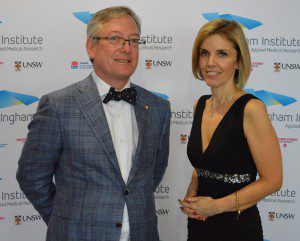
An audience of sponsors, supporters, researchers and scientists burst into applause when the winners of three prestigious awards were announced at the third annual Ingham Institute awards dinner last Friday at the Liverpool Catholic Club.
The event acknowledged and celebrated the tremendous efforts of Ingham Institute researchers for their achievements over the past 12 months.
Sophie Scott, the high profile ABC health and medical reporter, was the MC for the evening.
Three major awards were presented, including the Lady Mary Fairfax Distinguished Researcher Award, the Excellence in Teaching Award (sponsored by the South Western Sydney Local Health District – SWSLHD) and the Early Career Researcher (sponsored by Liverpool City Council), all of whom received $5,000.
There was also a special presentation by international special guest speaker Dame Valerie Beral, Professor of Cancer of Epidemiology at the University of Oxford in the UK. Prof Beral is renowned globally for her work with the Million Women Study, a major worldwide study that investigates the causes and effects of a range of diseases associated with ageing in women.
[social_quote duplicate=”no” align=”default”]“We have some of Australia’s best talent working at the Ingham Institute on a broad range of different health condition affecting our community and Australia at large including cancer, early childhood disease, injury and mental health,” Prof Michael Barton said in his speech.[/social_quote]
“The night served as a wonderful opportunity to reflect and celebrate our researchers’ achievements and give them the recognition they deserve for doing their bit to improve and save lives,” said Prof Barton, who is also clinical director bat the institute.
The big winner on the night was UNSW Australia researcher Prof Afaf Girgis, the Lady Mary Fairfax Distinguished Researcher Award winner.
Highly deserving of the top award, Prof Girgis’ illustrious research career spans over 25 years which has firmly embedded her as a leader in psycho-oncology, a specialist area of cancer research that investigates the psychological impact of cancer on patients and caregivers.
Since 2010 Professor Girgis has published 131 peer reviewed papers covering a broad sub-set of topics in her area of expertise including the prevention and early detection of cancer, development and psychometric testing of measures to assess cancer patients, caregivers and health care professionals unmet needs.
She also led the development of Coping-Together, an Australian-first study targeted at couples adjusting to a recent diagnosis of cancer to give them vital coping strategies.
Since her appointment at the Ingham Institute in 2011, Prof Girgis has been instrumental in shaping the psycho-oncology research group into being one of the key strengths of the cancer research stream at the Ingham Institute.
The winner of the Excellence in Teaching Award was UNSW Australia researcher asociate professor Therese Becker, the Institute’s Circulating Tumour Cells (CTC) program leader.
Apart from her high level researcher role, she has also established herself as a strong teacher and mentor to Australia’s next generation cancer researchers.
Next in line was Dr Sankar Arumugam from the Ingham Institute’s Medical Physics group who got the gong for the Early Career Researcher Award.
Presented by Liverpool Mayor Ned Mannoun, Dr Arumugam’s award highlighted his outstanding work to improve the accuracy and safety of radiotherapy, one of the main methods of cancer treatment which uses a Linac Accelerator to produce X-rays that kill or damage cancerous tumours to stop them from growing.
Dr Arumugam’s research has enabled him to develop a variety of tools that has significantly enhanced the scheduling and efficiency of radiotherapy treatment delivery, which he conducts while carrying out a full-time clinical position at Liverpool Hospital.
Dr Arumugam’s work has enabled the Medical Physics group to progress in leaps and bounds to improve the standard of radiotherapy treatment for Australian cancer patients affected by a range of cancers including breast, prostate, brain and colorectal cancer.
Ingham Institute chairman Terry Goldacre congratulated all of the winners and nominees for their tremendous achievements and efforts to find better ways to treat, and ultimately eradicate, critical diseases.
“The Ingham Institute’s research team consists of some of the best medical minds in Australia and continue to achieve great things on both the national and international stage. In my eyes, everyone is a winner tonight,” he said.
